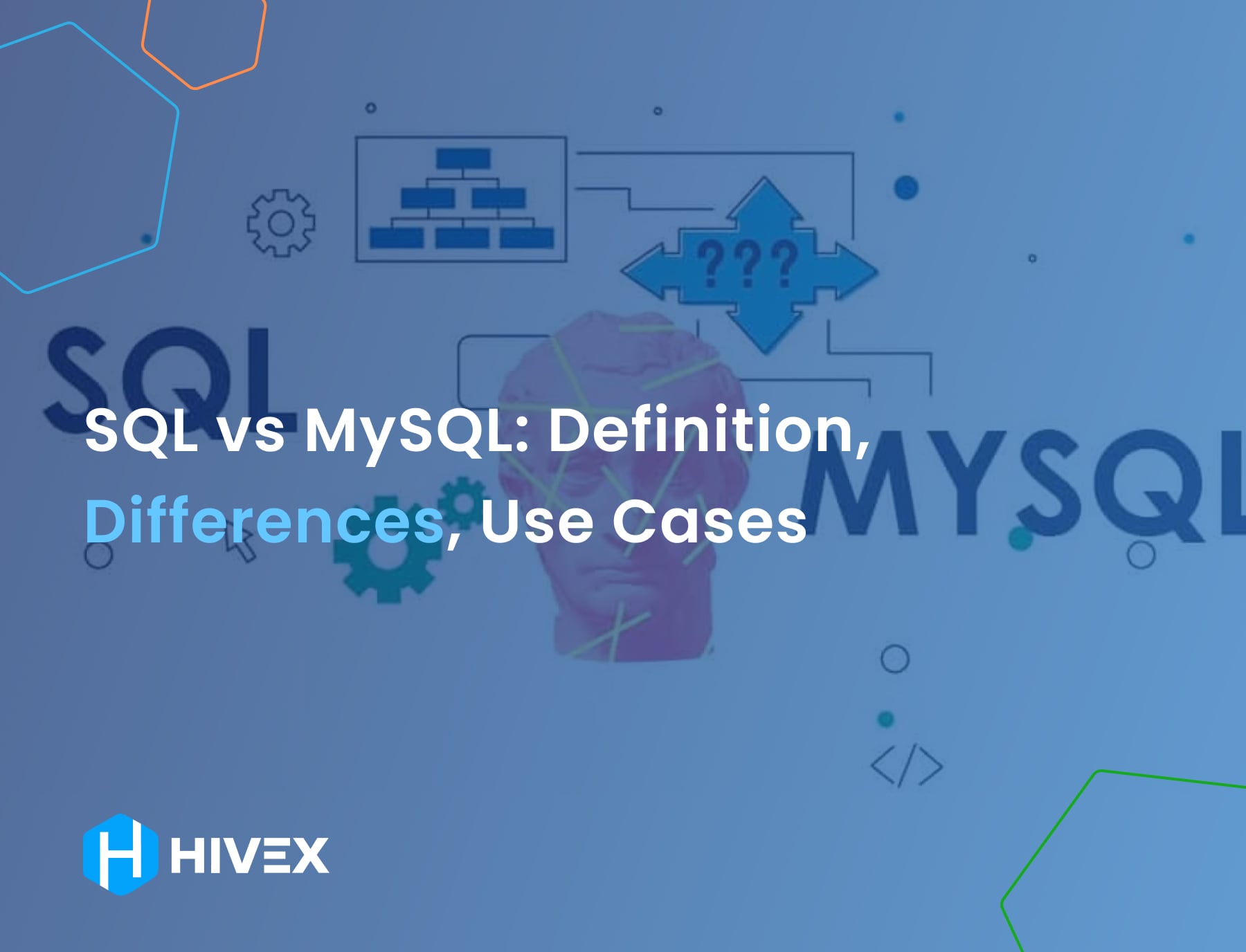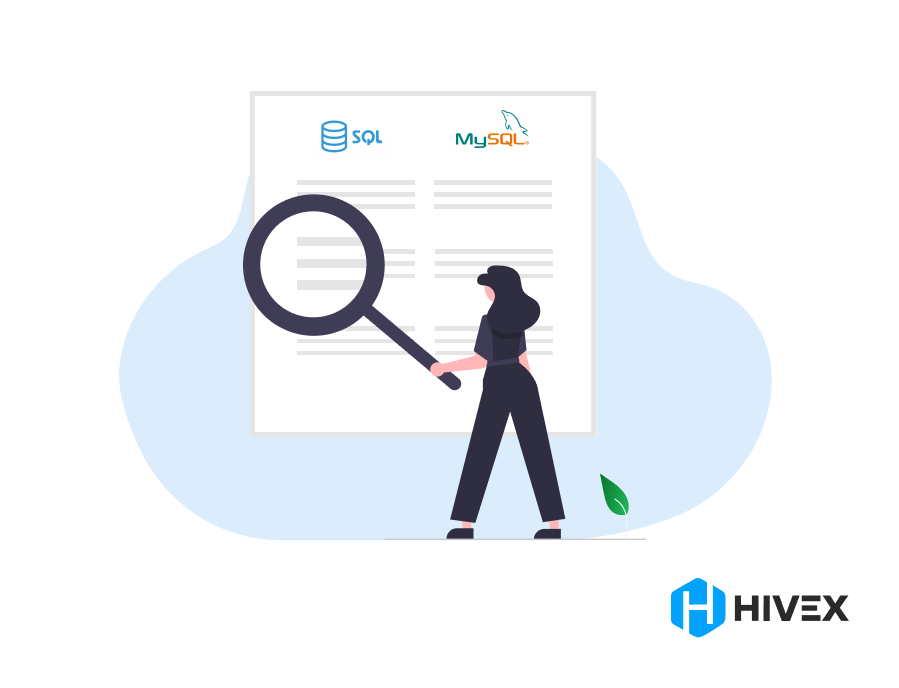SQL vs MySQL Explained: Definitions, Differences + Use Cases

When we talk about managing data efficiently, SQL and MySQL often come up in the conversation. Both are important in database management but serve different purposes.
SQL, or Structured Query Language, is the standard language for dealing with relational databases. It’s like the set of commands you use to interact with and manipulate data.
On the other hand, MySQL is one of the most popular database management systems that uses SQL to help you organize and retrieve data effectively.
Understanding how SQL differs from MySQL can help you select the appropriate tools for your data tasks, improve your workflow, and make decisions that significantly impact your projects.
Quick Navigation
What is SQL?
SQL stands for Structured Query Language. It is essentially the go-to method for managing any relational database.
SQL helps you perform tasks such as retrieving specific data from larger datasets, updating data, or organizing data in a database.
It’s not tied to a single database system – its versatility allows it to be used across various platforms that manage data across numerous industries.
This widespread use makes SQL a fundamental skill for anyone in data handling roles.
What is MySQL?
MySQL is a database management system that stands out due to its open-source nature, allowing users to modify its code to suit their specific needs.
It utilizes SQL as its primary language to manage the data within the databases it oversees. MySQL supports a broad range of operating systems and is an integral component of many web applications, powering platforms from small personal blogs to large corporate websites.
Its significance in relational database management systems (RDBMS) lies in its reliability, scalability, and ease of use, making it a preferred choice for developers looking to build robust data-driven applications.
Core Differences Between SQL and MySQL

Language vs. System
One of the essential distinctions to understand is that SQL is a language, while MySQL is a system.
SQL, or Structured Query Language, is the standard method for interacting with and managing databases. It’s not software but a language that various database systems use to perform operations like searching, updating, and organizing data.
In contrast, MySQL is a database management system that uses SQL to operate.
It provides the necessary tools and environment to store, retrieve, and manage data in a database. MySQL is an actual software package that includes many additional features like user management, security, and data integrity tools, which are not provided by SQL alone.
Accessibility
MySQL is widely recognized for its open-source status, meaning it is available for free and can be modified by anyone to meet their needs better or improve its functionality.
This accessibility encourages a vast community of developers and engineers to contribute to its development, enhancing its capabilities and security over time.
On the other hand, SQL, as a language, adheres to strict standards established by the American National Standards Institute (ANSI).
These standards ensure that SQL remains consistent and interoperable across different database systems, which helps maintain its status as the foundational language for database management.
Syntax and Usage
While SQL commands form the backbone of how operations are carried out in systems like MySQL, there are differences in syntax and usage that are important to note.
SQL syntax is quite universal; however, different database systems, including MySQL, sometimes extend standard SQL with their own proprietary extensions. These extensions can provide additional functionality but may not be compatible with other systems.
MySQL, for instance, might implement additional functions or features that utilize SQL syntax but also include unique commands that aren’t part of standard SQL.
For example, MySQL uses specific SQL extensions for handling database replication or particular types of index management, which are not found in standard SQL.
While someone with a solid understanding of SQL can operate within MySQL, they might still encounter aspects of MySQL that require learning its specific implementations of SQL commands and features.
Detailed Comparison: SQL vs MySQL

Storage Engines
| Feature | SQL | MySQL |
|---|---|---|
| Storage Engines | Supports primarily a single storage engine tailored for specific database requirements. | Supports multiple storage engines such as InnoDB, MyISAM, and Memory, allowing optimization based on use-case-specific needs. |
Security Features
| Feature | SQL | MySQL |
|---|---|---|
| Access Control | Robust access control with permissions and roles defined at a granular level. | Access control implemented but less granular than some other database systems. |
| Data Encryption | Supports extensive encryption options to secure data at rest and in transit. | Provides encryption but with varying levels depending on the version and configuration. |
| Audit Capabilities | Comprehensive auditing features are often available, especially in enterprise versions. | Auditing is available but might require additional plugins or third-party software. |
Performance and Speed
| Feature | SQL | MySQL |
|---|---|---|
| Query Performance | Often faster with complex queries due to sophisticated optimization algorithms. | Performance can vary. Generally optimized for read-heavy operations. |
| Speed with Large Databases | Handles large databases and high transaction volumes efficiently with less performance degradation. | Can manage large databases but may require fine-tuning for optimal performance at scale. |
Platform and Language Support
| Feature | SQL | MySQL |
|---|---|---|
| Operating Systems | Primarily designed for Windows but with support for Linux and Docker-based deployments. | Cross-platform support, including Linux, Windows, macOS, Solaris, and FreeBSD. |
| Programming Language Integration | Extensive support for .NET, C#, and other languages within the Microsoft ecosystem. | Broad support for languages including PHP, Perl, Python, Java, and more, facilitating diverse application development. |
Practical Applications and Use Cases

Understanding where SQL and MySQL shine can help you choose the right tool for your project’s needs. Let’s explore the industries and scenarios where each is most effective, along with real-world examples that demonstrate their capabilities.
Where is SQL Preferred?
SQL is a critical tool across many industries, thanks to its ability to manage complex data operations efficiently. Here’s where it’s especially valuable:
- Finance and Banking: SQL is fundamental for handling transactions, managing accounts, and detecting fraud in real time. Its ability to execute complex queries quickly and accurately is essential in the fast-paced financial sector.
- Healthcare: hospitals and clinics rely on SQL to manage patient records, treatment histories, and insurance details. The language’s robust data handling ensures sensitive information is managed securely and efficiently.
- E-commerce: from transaction processing to customer data management and inventory tracking, SQL supports large-scale e-commerce platforms in managing vast amounts of data securely and swiftly, often using robust systems like Microsoft SQL Server.
Where is MySQL Most Effective?
MySQL is favored for its flexibility and ease of integration, particularly in:
- Web Development: integral to the LAMP (Linux, Apache, MySQL, PHP/Python/Perl) stack, MySQL is a go-to for developing dynamic websites and applications. It efficiently manages large volumes of data, making it ideal for high-traffic websites.
- Startups and small businesses: MySQL’s open-source nature and cost-effectiveness make it a popular choice for startups and small businesses that need a reliable database solution without the hefty price tag. It scales well from small projects to larger applications as the business grows.
Choosing the Right Tool for Your Needs

Selecting between SQL and MySQL can seem daunting. However, by focusing on your specific project requirements and the skills of your team, you can make an informed decision that will benefit your operations in the long run.
Factors to Consider When Selecting Between SQL and MySQL
1. Project Scale and Complexity
- for large-scale, complex projects requiring robust transaction support and advanced security features, a system like Microsoft SQL Server might be more suitable due to its comprehensive features and scalability.
- for smaller projects or applications where development speed and cost-efficiency are priorities, MySQL offers a flexible and cost-effective solution that doesn’t compromise on performance for typical web applications.
2. Budget Constraints
- if budget is a concern, MySQL’s open-source nature makes it a compelling choice as it can significantly reduce upfront costs.
- commercial SQL solutions often come with support and advanced features, which, while increasing costs, also provide value in environments where data integrity and uptime are critical.
3. Team Expertise and Resources
Consider the expertise of your team.
- if your team is more familiar with Microsoft technologies and environments, SQL Server may be a more seamless fit.
- if your team excels in open-source environments and is used to Linux-based systems, MySQL could leverage their existing skills more effectively.
4. Integration Needs
Evaluate the other systems and technologies in use in your company.
- SQL Server integrates well with other Microsoft products and services, which can be a significant advantage in an enterprise environment.
- MySQL (being platform-independent) offers great flexibility and is excellent for cross-platform development.
How to Choose Based on Your Project Requirements and Team Expertise
Let’s simulate different scenarios.
Case #1: you develop a new web application
If you’re building a new web application from scratch and need a database that is easy to set up and manage and you have a team familiar with PHP or Python, MySQL is likely the best choice.
It’s perfect for rapid development cycles commonly seen in startups and agile environments.
Case #2: your enterprise application needs seamless integration
For enterprise applications where you need deep integration with other business systems, especially if you are already embedded in a Microsoft environment, SQL Server might be the optimal choice.
Its ability to handle complex queries and provide enterprise-level support will be beneficial.
Case #3: you are expanding an existing application
If you are looking to scale an existing application that needs to handle increased loads or more complex data operations, assess the current database’s performance.
If it’s built on MySQL and scaling issues are emerging, consider migrating to a more robust system like SQL Server.
However, if the load is manageable, enhancing MySQL with additional optimizations might be sufficient.
Choosing between SQL and MySQL doesn’t have to be a binary decision. Often, it’s about matching the right technology with the right project and team.
Think about where your application will be in the next five years and choose a database that aligns with those long-term goals.
Market Demand and Career Opportunities

Deciding whether to enhance your skills in SQL or MySQL depends on understanding their market demand, the necessary skills, and future career prospects. Here’s a clear guide on what to expect from each technology on the job market.
Which is More in Demand, SQL or MySQL?
SQL is universally in demand across various sectors due to its essential role in database management. Organizations of all types require professionals who are proficient in SQL, making it a staple skill for careers in data analysis, science, and software development.
MySQL holds a special place in industries focused on web technology and startups. Its relevance in settings that prioritize rapid development and cost efficiency makes it a common requirement for positions such as backend developers, database administrators, and IT architects.
Key Skills Required for Developers Working with SQL and MySQL
- SQL Command Mastery: essential for crafting and refining queries to interact with databases effectively.
- Database Design and Management: skills in structuring databases to support business needs while maintaining data accuracy and speed.
- Optimization Techniques: enhancing database performance through thoughtful design choices, such as proper indexing and query improvements.
- Security Measures: understanding how to safeguard databases against breaches and unauthorized access is crucial.
- Data Recovery: knowing how to implement reliable backup solutions and restore data accurately is vital for maintaining business continuity.
You may also like: How much do software developers make?
What Can Developers Expect in the Coming Years?

As we look toward what’s next for SQL and MySQL, these database technologies are gearing up to become even more integral in fields like artificial intelligence, machine learning, and expanded business technologies, such as CRM systems.
Integration with AI and ML
With AI and machine learning transforming how we manage large datasets, SQL and MySQL lead the way, facilitating the management and querying of structured data these technologies rely on.
For applications like ChatGPT that rely on vast data stores to generate responses, efficient database management becomes critical.
SQL’s role in data preparation and extraction is vital for feeding accurate information into machine learning models, enhancing their learning and accuracy.
Enhanced Database Functions with CRM Systems
CRM systems, which are essential for tracking customer interactions and data analytics, rely heavily on robust database management.
SQL and MySQL manage the extensive data these platforms gather to help businesses understand customer behaviors and streamline decision-making processes.
As CRM platforms become more sophisticated to offer more real-time analytics and personalized experiences, the performance of databases like MySQL will be crucial in supporting these sophisticated functionalities.
Cloud Computing and Database as a Service (DBaaS)
The move towards cloud computing has made SQL and MySQL skills more relevant than ever.
Many cloud services offer Database as a Service (DBaaS), where SQL and MySQL are used to manage databases without the complexities of direct hardware or software management.
This trend is about making database management more accessible and flexible, allowing businesses to scale without significant physical infrastructure investments.
Expected Developments in Database Technology
In the future, developers can look forward to SQL and MySQL supporting quicker data processing and handling more complex queries efficiently.
We might see innovations in how data is indexed and queries are optimized, enabling real-time data analysis and better handling of larger, more complex datasets.
FAQ

1. What is a Relational Database Management System (RDBMS)?
A relational database management system (RDBMS) is a type of database management system that stores data in a structured format, using rows and columns. This setup allows for easier data manipulation and querying.
Examples of RDBMS include MySQL and SQL Server, which are both powerful tools for managing relational databases. These systems allow for the creation of databases, efficient data storage, and performing complex queries and analyses.
2. How do Relational Database Management Systems like MySQL and Microsoft SQL Server differ?
The primary difference between SQL (Structured Query Language) and specific systems like MySQL and SQL Server lies in their use and capabilities.
MySQL is known for its open-source nature, making it highly flexible and preferred in web development environments.
SQL Server, on the other hand, is a Microsoft product that offers deep integration with other Microsoft services and enhanced security features.
Both serve as excellent database management tools, but their use may depend on specific business needs and environments.
3. What are the advantages of using Microsoft SQL Server in a relational database management system?
Microsoft SQL Server excels as a relational database management system due to its robust security features, comprehensive data management capabilities, and scalability. It is particularly beneficial in environments that require complex data analytics and high transaction processing.
SQL Server supports a variety of programming languages and comes with powerful tools like SQL Server Management Studio, which enhances its ability to manage relational databases effectively.
4. Why is Structured Query Language essential for managing relational databases?
SQL is essential for managing relational databases because it provides a standardized method for querying and manipulating the data within these databases.
SQL statements are used to perform different tasks: retrieve specific data, and update or delete data from a relational database. Its wide adoption makes it compatible with almost all database management tools, allowing for versatility across different systems.
5. How do SQL commands interact with relational database management systems to manipulate data?
SQL commands interact with relational database management systems by sending instructions directly to the database to retrieve, add, delete data, or modify it.
For example, the SQL statement `DELETE FROM Customers WHERE CustomerID = 1;` would delete data related to a customer with the ID of 1 from a relational database.
These commands are crucial for data manipulation and ensure that users can manage their data effectively, regardless of the specific RDBMS, such as MySQL or SQL Server, they are using.
Looking to enhance your team with skilled SQL or MySQL developers?
We are always here to help!
Our straightforward process takes care of everything from finding to testing candidates, making hiring easy so you can focus on growing your business.
Ready to add top talent to your team? Let’s connect today!


